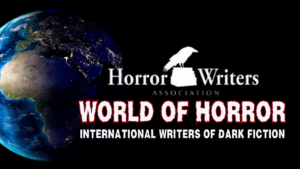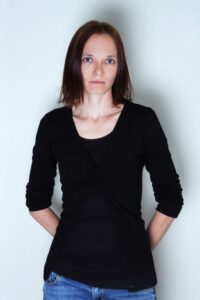World of Horror: Interview with Daria Pietrzak


Daria Pietrzak is a writer of Polish origin, and has been settled in Spain since childhood.
She has studied artistic photography with the intention of going into the world of cinema, although it is a dream that has never materialized. It was not until a few years later when she found another way to tell her stories, and since then, she strives to draw with words the images that populate her imagination. She is a lover of horror, to which she devotes most of her stories and novels, and of her free time, a fan of fantasy worlds and an inveterate role-player. She writes adventures and has several projects related to role-playing games underway.
To date she has published Cuentos extraños, El morador and Inanición.
https://www.amazon.com/El-morador-Spanish-Daria-Pietrzak/dp/8412167392
What was it about the horror genre that drew you to it?
Horror, in any of its variants, has been present in our lives since our earliest childhood, when everything was new and unknown and full of exciting and terrifying possibilities at the same time. As we grow older, horror stories allow us to play at being children again: they scare us, surprise us, awaken our curiosity, and amaze us. They transform us into small children in a strange world that we do not fully understand, but with the difference that, when we close the book’s covers, we find ourselves safe again.
I think all horror consumers have something in common and it is that pleasure, that curiosity to look face to face with the unknown. Reading horror is peeking behind that door you’ve been told not to open, it’s sneaking a puff on a cigarette after school, hoping no one sees you, it’s doing that thing that makes your heart race or that turns you inside out because as you walk through the pages of the book everything is allowed and you know that no matter what happens, the monster won’t be able to catch you in the end.
I’ve never been brave enough to fight my own monsters, but I’m great at living with them.
Is there a horror tradition in your country, in your culture? A taste for horror, a market? Not necessarily literature; perhaps oral tradition too.
I think it is something that is found in all cultures and we may find that we share our fears more often than any other cultural or social element.
Horror, mystery, and black chronicle is something that currently attracts a large number of followers in different media, not only in literature but also on movie screens, series or podcasts, with an increasing selection of programs focused on stories of this type, recovering a bit the style of the old radio programs.
I don’t know if it can be called a tradition, but there is a sector of fans loyal to the horror genre that is growing every day thanks to the appearance of new authors and independent publishers specialized in the subject that carry out a magnificent work of selection and edition and fight to give greater visibility to this literature.
Luckily, we have in our country some of the best genre literature festivals and that is thanks to the fans that year after year fill these spaces wanting to know and read more.
Who are some of your favorite characters in horror, internationally and/or in your own culture?
Three of my favorite horror references came not from the pages of a book, but from a television screen, and they have to do with the first time I experienced real terror willingly.
From the first time I heard the sound of a running chainsaw and the screams of agony and terror that followed, I could never get them out of my head. Although at that time I only heard the movie, and I couldn’t see anything because I had my eyes closed and my hands over my face to avoid the temptation to look, so many scenes passed through my imagination that the film itself ceased to be of importance. I don’t even know what it was and I don’t care. The spark had already ignited inside me.
Since then I feel a special predilection for characters like Michael Myers, Jason Voorhees or Leatherface. They have taught me that the monster is not always the one hiding behind the mask and also that I enjoy being like a kid in an amusement park with a good bath of blood and guts. And sometimes you just have to give the body what it asks for, they taught me that too.
Do you make a conscious effort to include characters and settings from your country in your writing and if so, what do you want to portray?
It is not a conscious purpose, but rather the opposite—some legends or characters of local folklore sneak into my stories by their own free will. They are elements that have been with me for as long as I can remember, that have permeated me for one reason or another and sooner or later they show their face in some twist of the story.
I remember characters from children’s stories that over time have taken on a more realistic appearance because with time I have discovered that most of the monsters and creatures I knew in my childhood are nothing more than reflections of what I now encounter in my adult life. The human being has an amazing ability to dress up as a lamb.
If you are not a native English speaker, but write in English, do you first think of horror in your native language or English? How do you draft them in your mind, in English or your mother tongue?
In my case, I write in Spanish, but my mother tongue is Polish. I recognize that it would be impossible for me to write in my native language; I visualize my inner world entirely in Spanish and I write in the language in which I dream.
What has writing horror taught you about the world and yourself?
Writing horror is a small and insignificant act of freedom in a world that seems to move on rails, but it is an act that demands absolute sincerity towards that blank page, because, once you cross the barrier, you can only continue forward and let the story tell you what it wants to tell you, even if it is painful to do so.
You can learn a lot from each other by discovering their deepest fears, by getting to know the nightmares that torment them. Tell me what you fear and I will tell you who you are. Horror is something intimate, private and personal and to share it with someone is to somehow let that person into your life.
Writing offers you the opportunity to make the stories of others your own and to live through the experiences of their characters. To look, to explore, to taste, to touch, without consequences, without pain, without concessions and without asking permission. That is the magic of literature.
And I have discovered that with each story I tell I discover something new about myself, I learn to be a little braver and a little more sincere. On the blank page I unwittingly capture my own fears, my feelings and my thoughts; what I long for and what I hate with all my might suddenly appears there, interwoven with the story, hidden between the pages of my book.
How have you seen the horror genre change over the years? And how do you think it will continue to evolve, both in the US and in your country?
Before embarking on the adventure of writing my own stories I was a regular consumer of horror, specifically scary, gore and B-movies. I always remember it as the genre of the low shelf at the video store or the back shelf at the back of the store.
Now that I have had the opportunity to experience it from the inside, I have discovered that there is much more horror than meets the eye. It’s there, but it’s hard to find. There are a lot of authors telling incredible stories and, more importantly, a lot of readers eager to discover new horrors, new authors and different stories. We are legion. Too bad it’s sometimes so hard for us to find each other.
How do you feel the International horror writing community has been represented thus far in the market and what hopes do you have for representation going forward?
If you ask any passerby for the name of a horror writer they will tell you the name of the best-selling horror writer in the world that we all have in mind and, with a bit of luck, the name of two or three other classics. And this should bother me? No, I don’t aspire for horror to become a mass genre, that’s dangerous because it would run the risk of becoming something it’s not. It’s easy to lose your way when everyone is watching your step. But I would like readers of general literature to lose their fear (as ironic as it sounds) of approaching a horror book. It’s the only way to stop it from being considered a second-division genre, something that’s only good for passing the time and that most of the time “isn’t scary”. We are not the students at the back of the class, we don’t have to disguise our stories under seemingly more serious categories like thriller for the reader or publisher to look at the title without prejudice and with respect. I hope that in time that can change and we can stop being the lone girl at the prom.
Who are some international horror authors you would recommend?
An author who unfortunately is no longer with us but who I want to recommend is Tom Piccirilli. In his novels, I have discovered an unhealthy, gray and sick atmosphere that has touched me very deeply.
A current and very present author in horror literature that I think everyone should read is Philip Fracassi. His stories are strange, disturbing, and at times, shattering. I was very happy to discover him.
And of my closest colleagues, I have to recommend Nieves Mories, for her stories full of sincere brutality; Jesús Gordillo, for his astonishing ease in telling you a story and making you believe it, and Mar Goizueta, for her beautiful and dark way of understanding the world and showing it to the reader as if it were something new.
What is one piece of advice you would give horror authors today?
The first advice would be to disregard anything I say, and the second is to write whatever you want. They should write what their body asks them to write. They should not let themselves be inhibited by what people will say, by what is correct or what is well seen at a given moment. Above all, writing should be an act of absolute freedom. And if what you have chosen is to write horror, you will most likely starve to death, but I assure you that at least you will have a great time.
And to the writers from your country out there who are just getting started, what advice would you give them?
Now that I’ve got the hang of giving advice, the first thing I would tell you is that, as much as it may bother us, writing a book doesn’t make us writers. That will come in time.
Giving up is easy, continuing despite all the obstacles along the way is an act of senseless masochism that does honor to this profession.
What better offering to the genre than a little of our blood, sweat and tears?



